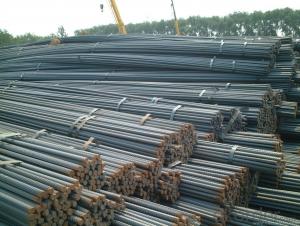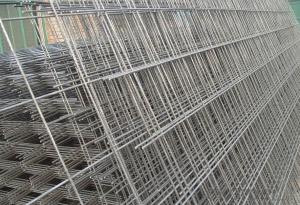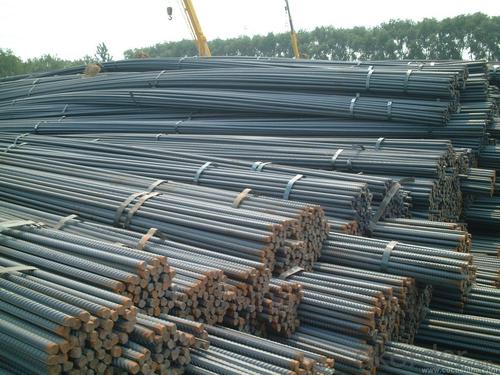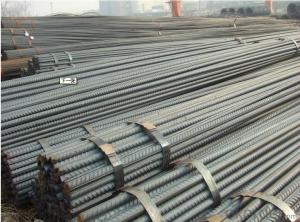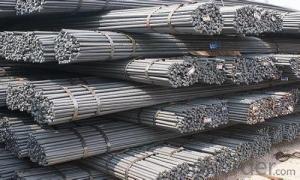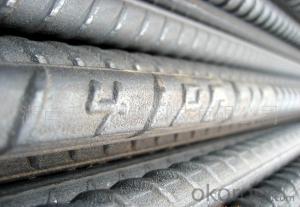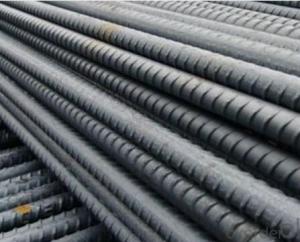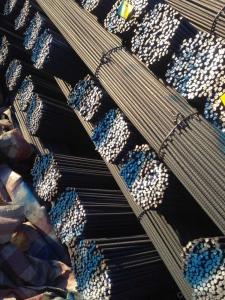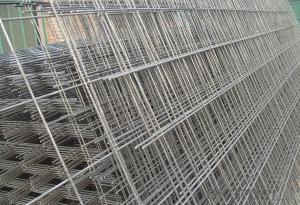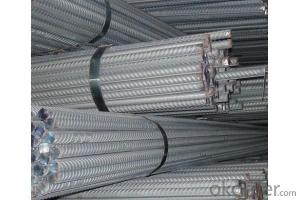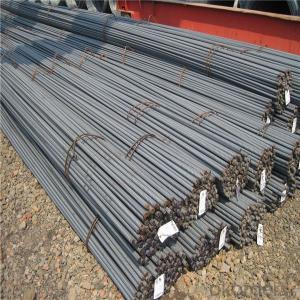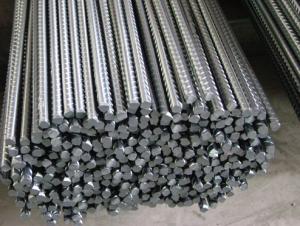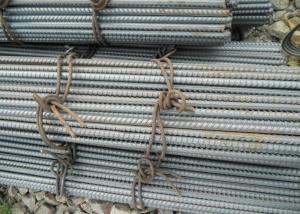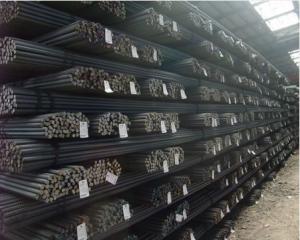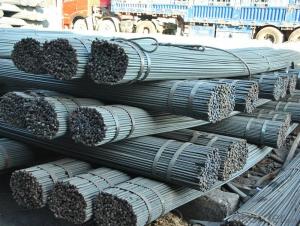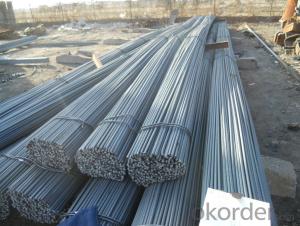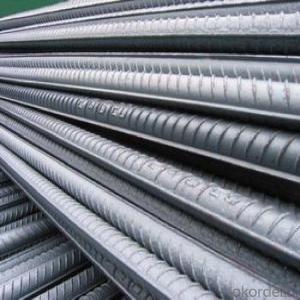Concrete Reinforcing Steel Bar from 8mm to 40mm
- Loading Port:
- Tianjin
- Payment Terms:
- TT or LC
- Min Order Qty:
- 300 m.t.
- Supply Capability:
- 1500 m.t./month
OKorder Service Pledge
OKorder Financial Service
You Might Also Like
Concrete Reinforcing Steel Bar from 8mm to 40mm
Main Structure of Concrete Reinforcing Steel Bar
Standard: AISI, ASTM, BS, DIN, GB
Grade: HRB400
Diameter: 6mm-10mm
Length: 1.6-1.9ton/coil
Application: for construction
rebar coil size: 6mm-10mm
steel grade: hrb400 , hrb500, gr.60 , hrb335,q235 q255 q275
Description for Concrete Reinforcing Steel Bar
Type | Coiled reinforced bar/rebar coil |
Steel Grade | hrb500, gr.60 ,q235 ,q255,q275 |
Size | 6mm-10mm |
Unit weight | 1.6-1.9tons/coil |
Application | Building/project construction |
Packing | In coil with steel strip ,in bulk . |
Datas for Concrete Reinforcing Steel Bar
HRB400 | Chemical Composition(%) | C | Mn | Si | P | S |
0.25max | 1.60max | 0.80max | 0.045max | 0.045max | ||
Mechanical Property | Yield Strength | Tensile Strenth | Elongation | |||
400Mpa min | 540Mpa min | 16% | ||||
HRB500 | Chemical Composition(%)
| C | Mn | Si | P | S |
0.25max | 1.60max | 0.80max | 0.045max | 0.045max | ||
Mechanical Property | Yield Strength | Tensile Strength | Elongation | |||
500Mpa min | 630Mpa min | 15% | ||||
HRB335 | Chemical Composition (%) | C | Mn | Si | P | S |
0.25max | 1.60max | 0.80max | 0.045max | 0.040max | ||
Mechanical Property | Yield Strength | Tensile strength | Elongation | |||
335Mpa min | 455Mpa min | 17% | ||||
FAQ
Q: Why should you choose us:
A: 1. More than 10 years experience in this industry
2. 100,000 tons exporting per month
3. Professional foreign trade tea
4. OEM&ODM capacity
5. High quality assured & competitive price
6. Try our best to meet your needs & save your budget
7. Very popular in Southeast Asia, Africa, Mid-East and South America etc.
8. VIP membership system, first time customers and long-term cooperation customers can get extra discount on some products.
12px; font-style: inherit; font-variant: inherit; font-weight: 400; line-height: inherit; float: none; word-wrap: break-word; color: rgb(0, 0, 0); border: 1px solid rgb(204, 204, 204);"> Elongation 335Mpa min 455Mpa min 17%
Picture:
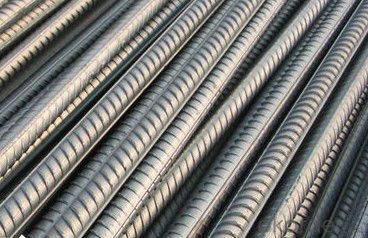
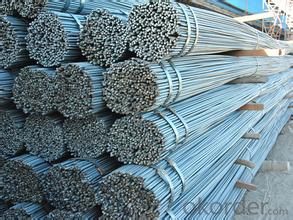
- Q: Can steel rebars corrode or rust over time?
- Yes, steel rebars can corrode or rust over time due to exposure to moisture and oxygen.
- Q: Are steel rebars fire-resistant?
- Yes, steel rebars are generally considered to be fire-resistant. Due to their high melting point and low thermal conductivity, steel rebars can withstand high temperatures and maintain their structural integrity in the event of a fire. However, their fire resistance can be compromised if exposed to extremely high temperatures for extended periods of time.
- Q: 12 how much is one ton of thread steel?
- 12 thread steel one meter weight: 0.888kg
- Q: Are steel rebars suitable for use in historical restoration projects?
- Depending on the specific requirements and circumstances, steel rebars may be appropriate for use in historical restoration projects. They possess high strength, durability, and the ability to effectively reinforce structures, making them a popular choice in modern construction and renovation endeavors. Nevertheless, it is crucial to consider the preservation and authenticity of the original structure when contemplating the utilization of steel rebars in historical restoration projects. Historical buildings often possess unique architectural features and materials that must be treated respectfully and preserved. In certain situations, the use of steel rebars may not be suitable, particularly if it compromises the historical integrity or visual appearance of the structure. This is particularly relevant for buildings with significant historical value or those protected by heritage regulations. If it is determined that steel rebars are necessary for structural reinforcement in a historical restoration project, it is vital to integrate them discreetly, minimizing their visual impact. This can be achieved by concealing them within the original materials or utilizing techniques that replicate the appearance of the original construction. In conclusion, while steel rebars offer structural advantages and durability, their use in historical restoration projects should be carefully evaluated to ensure they align with the preservation goals and requirements of the specific project. The preservation of historical authenticity should always be a priority in such endeavors.
- Q: How long do steel rebars typically last before corroding?
- Steel rebars typically last for several decades before they start to corrode, depending on various factors such as the quality of the steel, environmental conditions, and the presence of protective coatings.
- Q: How do steel rebars contribute to the structural integrity of a building?
- Steel rebars, also known as reinforcing bars, play a crucial role in enhancing the structural integrity of a building. These bars are embedded within concrete structures, such as beams, columns, and slabs, to provide tensile strength and prevent cracking or failure under load. By reinforcing the concrete, steel rebars help distribute and resist the forces acting on the structure, ensuring its stability and durability.
- Q: Can steel rebars be used in bridge rehabilitation projects?
- Yes, steel rebars can be used in bridge rehabilitation projects. Rebars are commonly used to strengthen and reinforce existing concrete structures, including bridges, to improve their load-carrying capacity and overall structural integrity.
- Q: Can steel rebars be used in the construction of residential communities?
- Steel rebars are a popular choice in the construction of residential communities. They are extensively utilized in the construction industry to reinforce concrete structures, including residential buildings. By enhancing the load-bearing capacity and resistance to cracks and other structural damages, they provide durability and strength to the concrete. In residential construction, steel rebars are commonly employed to reinforce foundation footings, walls, columns, and beams. This reinforcement ensures the building's structural integrity, leading to a safer and longer-lasting structure. Moreover, steel rebars can be easily customized and shaped according to specific design requirements, allowing for flexibility in construction. All in all, the use of steel rebars in residential communities is widely accepted and a prevalent practice in the construction industry.
- Q: Are steel rebars easy to bend and shape?
- No, steel rebars are not easy to bend and shape as they are typically made of strong and rigid materials, making them resistant to deformation.
- Q: How are steel rebars coated with epoxy?
- Epoxy coating, also known as epoxy rebar coating, is utilized to coat steel rebars for the purpose of protection against corrosion and other environmental factors. To initiate the process of coating steel rebars with epoxy, the first step involves preparing the surface. This essential stage entails the thorough cleaning of the rebars to eliminate any dirt, oil, or rust present. The significance of surface preparation lies in ensuring proper adhesion of the epoxy to the steel surface. Once the surface is adequately prepared, the application of the epoxy coating commences. There are various methods available for this application, including spraying, brushing, or dipping the rebars into an epoxy solution. The choice of method depends on factors such as the rebars' size and shape, as well as the desired thickness of the epoxy coating. Subsequent to the application of the epoxy, the rebars are allowed to cure. Curing is the process during which the epoxy hardens and attains its maximum strength. The duration of this process may vary depending on the specific epoxy product utilized, but it generally takes several hours or even days for the epoxy to fully cure. Upon achieving complete curing, the coated rebars are prepared for use. The epoxy coating acts as a protective barrier, effectively preventing the steel rebars from rusting and deteriorating over time. Additionally, it enhances the rebars' resistance to chemicals, moisture, and other corrosive substances. To summarize, epoxy coating proves to be an efficient method for safeguarding steel rebars against corrosion and extending their lifespan. It finds extensive application in construction projects wherein rebars are exposed to harsh environmental conditions, such as bridges, buildings, and infrastructure projects.
Send your message to us
Concrete Reinforcing Steel Bar from 8mm to 40mm
- Loading Port:
- Tianjin
- Payment Terms:
- TT or LC
- Min Order Qty:
- 300 m.t.
- Supply Capability:
- 1500 m.t./month
OKorder Service Pledge
OKorder Financial Service
Similar products
Hot products
Hot Searches
Related keywords
